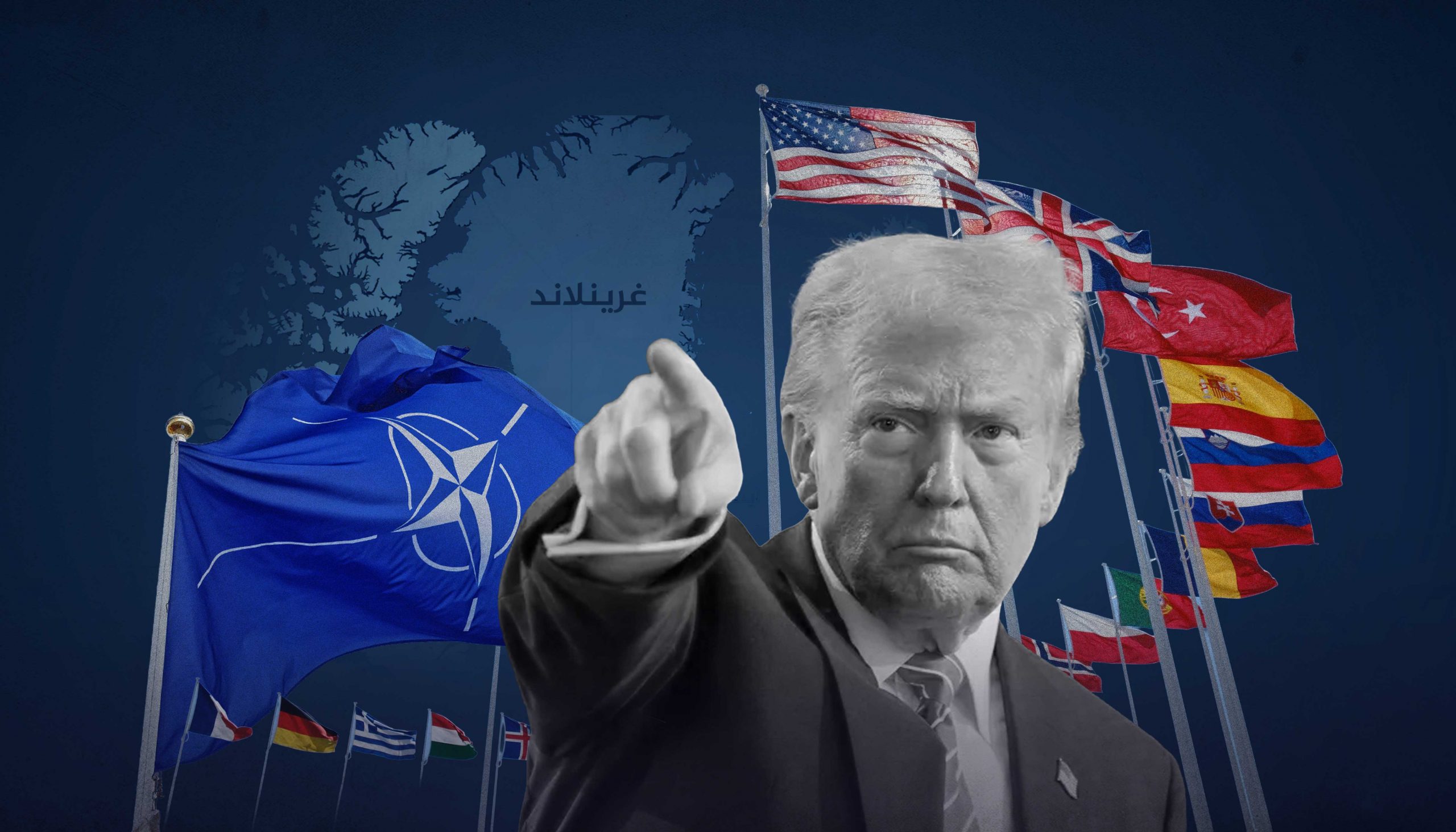President Donald Trump’s recent call for the North Atlantic Treaty Alliance (NATO) to expand its presence in the Middle East appears to have significant implications for Western policy in the region and regional security.
An expansion of the alliance’s mission reflects continued concerns about instability in Iraq and the potential threat posed by remnants of ISIS. From an Iraqi perspective, the apparent willingness of the government to countenance a continued NATO presence indicates the fragility of the Iraqi state and its reliance on external assistance.
However, Trump’s initiative is arguably more a consequence of domestic political calculations in Washington than a reflection of his interest in the country and is likely to be impeded by continued differences between the US and its European allies over regional policy, not least the options to contain Iranian influence.
The US initiative
The call for a greater NATO role in the Middle East came immediately after the US assassination of Major General Qassem Soleimani, leader of the Iranian Quds Force, on 3 January 2020. In the immediate aftermath of the crisis, Trump proposed that US troops could be partially replaced by NATO adopting a larger role in the region; his suggested name for the alliance was “NATO-ME”.
It can be argued that Trump playing to his domestic audience disguises the fact that his regional strategy has led his country into a dead end. Washington, having withdrawn from the Joint Comprehensive Plan of Action (JCPOA) for the Iranian nuclear program, is now in an intense struggle with Iran for regional influence. This is especially evident in Iraq, where the US risks being drawn further into sectarian rivalries after refusing to withdraw troops and even threatening Baghdad with sanctions.
As a result, the Europeans have responded warily to Trump’s initiative. While NATO’s Secretary-General Jens Stoltenberg agreed that “NATO has the potential to contribute more to regional stability and the fight against international terrorism”, he also noted that “the best way is to enable local forces to fight terrorism themselves”. Nevertheless, in response to the US request, NATO defense ministers agreed in February to reassign personnel from the US-led global coalition fighting against ISIS to the NATO Mission in Iraq (NMI) training and support activities.

The NATO Mission in Iraq (NMI)
The call for a greater NATO role in the Middle East came after the alliance upgraded its readiness to confront a potential threat from Russian President Vladimir Putin’s increasingly anti-Western stance. Despite Trump’s criticisms of the alliance, it has strengthened its presence in Eastern Europe since the Russian intervention in Ukraine and annexation of Crimea in 2014. These measures included an ”Enhanced Forward Presence” of four multinational battalions in Estonia, Latvia, Lithuania and Poland, and aircraft stationed in the Southern Air Policing mission based in Romania.[1] Indeed, the alliance’s renewed focus on the potential danger from the East has led many European states to question the need to make further commitments to the Middle East.[2]
The alliance’s initiative in Iraq was originally launched at the NATO Brussels Summit in July 2018 as NMI in response to the Iraqi government’s request for military assistance in stabilizing the country. This has led to a deployment later in the year of more than 500 training and advisory personnel from alliance members and partner countries including Australia, Sweden, and Finland.
The NMI has operated in parallel with the US-led coalition fighting ISIS. The coalition was formed in 2014 and which incorporates more than 11,000 personnel from 34 countries. In recent years, NATO’s operations in the Middle East have focused on training and advising local forces in the region. Besides its mission in Iraq, the alliance has also supported the coalition with AWACS surveillance planes. NATO has also maintained a 17,000-strong training and advisory mission in Afghanistan as well as small scale training activities in Jordan and Tunisia.
The NMI focuses on training and empowering Iraqi forces to deal with insurgency within the country in the aftermath of the ISIS uprising. Conceived as an initiative that could help build local capacity to defend Iraq as a unitary state, NMI has operated strictly as a non-combat entity that would advise and train security forces through partnerships with the Iraqi Ministry of Defense, the Office of the National Security Advisor, and other concerned institutions in Baghdad.
A broad-based conception of security reform was fundamental to the mission’s objectives, with the mission authorized to help counter corruption, strengthen the rule of law, respect the law of armed conflict, ensure the protection of civilians, prevent children from suffering the effects of armed conflict, and promote the “Women, Peace and Security agenda”.
Differences between Washington and its European allies
Trump’s call for a greater NATO participation in the region reflects a long-standing political narrative that the US carries too great a burden on behalf of the Western alliance and that the European countries in particular need to contribute more in terms of military personnel, resources, and finance. While committed to countering “global terrorism”, the US President is looking to the US’s closest allies from Europe and other regions to do more.
Many European states see NATO as the keystone of their national defense policies and have remained anxious about Washington’s commitment to underwrite their mutual security after Trump had denounced NATO as “obsolete” while campaigning for the Presidency in 2016. Some European states have also been alarmed at the US president’s attitudes toward Russia.
They have also noted his apparent ambivalence over NATO’s Article 5 obligation – that an attack against a single member state is an attack against all – and speculated that the current US administration would not come to their aid in the event of Russian aggression.
From the outset, the NMI has followed strict political parameters that reflect the political reservations of NATO member states over the danger of “mission creep” and uncertainties over long-term objectives similar to those encountered in the alliance operations in Afghanistan.
While the Europeans will continue to train Iraqi security forces, they will be very resistant to being drawn either into the US-Iran conflict or an occupation role in Iraq. Leaders such as Merkel and Macron have become used to Trump’s unpredictability and know that he will not focus for long on international questions while he is trying to get reelected at home. It is characteristic of the US President’s transactional mindset that he sees Europe as indebted to the US because of the leading role it took in suppressing ISIS in Iraq and Syria.
Expanding the NATO mission in Iraq makes political sense as it reduces the profile of the US forces. But it also runs the risk of repeating the failure of the alliance in Afghanistan. In Afghanistan, the fact that many NATO allies rallied to help the US, their operations were often impeded by a lack of means to fight effective counter-insurgency operations and were instead limited to reconstruction duties.
Also, some countries deployed forces only under strict political conditions that limited their operational effectiveness. Besides, NATO’s multinational command structure was also an inhibiting factor in quelling the Taliban’s insurgency to the point that the deteriorating security situation necessitated a US surge of forces to stabilize the situation. Another factor is the experience and skills acquired by the US Special Operations Forces since 9/11. The UK and France have similar capabilities, but on a much smaller scale and not readily deployable given their commitments elsewhere in the Sahel for example.
Prospects for the NMI
Disagreements between Washington and Europe over the best means of tackling instability in the Middle East stem over the most effective ways of countering terrorism and rehabilitating the region’s failed states.[3] Although Germany spends only 1.2 percent of GDP on its military budget, Angela Merkel’s government emphasizes the large sums it spends on overseas development aid and accepting refugees displaced by conflicts in Syria and elsewhere.
Trump has, however, received some limited support in Europe. The French President, Emmanuel Macron, stirred controversy in late 2019 when he described the alliance as suffering from “brain death”, a remark widely seen as alluding to the Trump administration’s unwillingness to consult allies over strategic and military policy.
However, Macron also stated at the NATO summit in London in December that the alliance could play a larger role in the Middle East. At the same time, Paris also noted that while French military personnel and resources were already heavily committed to the ongoing counterterrorism activities in Africa’s Sahel region, there was a case to be made for more European engagement, whether through NATO or building on structures such as the Mediterranean Dialogue and Istanbul Cooperation Initiative (ICI).
However, many European governments remain scarred by the experience of the heavy fighting undertaken by the International Security Assistance Force (ISAF) in Afghanistan. Finding an agreed formula for any intervention by a 29-member alliance will prove to be an extremely difficult task. Arguably, that reconfiguring an alliance based on collective defense in Europe to an interventionist force in the Middle East will strain existing capabilities too far.
The alliance has already committed resources such as surveillance overflights, intelligence sharing, and counterterrorism training. Also, NATO doesn’t have dedicated forces: it relies on aircraft, equipment, and personnel provided by individual member states. In terms of actual fighting against ISIS, the US has contributed to the bulk of the resources since 2014.
An expanded alliance mission must also take into account the persistent political and sectarian divisions in Iraq that were severely strained by the US assassination of Soleimani. Protests from Shiite parliamentary groups led to the passing of a nonbinding resolution calling on the government to terminate the presence of foreign forces in Iraq.
In the light of the US operation against Soleimani and the domestic criticism In Iraq, the government has insisted that any future NATO activities on Iraqi territory must have the prior approval of Baghdad. While the Iraqis indicated their readiness to accept NATO help with training and logistical support, future counterterrorism missions had to be staged based on “partnership”.[4]
This solution gained broad agreement from the alliance because it did not require transfers of fresh troops to Iraq. One European diplomat at NATO admitted that the redeployment “wouldn’t change much on the ground” and the allocation of new personnel to NMI amounted merely to “streamlining and rebranding”. After consulting with the Iraqi government, the NATO Secretary-General, Jens Stoltenberg, stated that expanded training activities would help avoid substantial combat operations in support of local governments. [5]
While the “southern camp” of nations with interests in the Mediterranean and the Levant are more concerned about a “spill over” of political instability and refugee movements, the alliance’s “eastern camp” remains fixated on the potential threat posed by Russia.
In addition, the NATO country most obviously engaged in the region, Turkey has been unable to persuade other alliance members that the Syrian Kurds pose a terrorist threat. In addition to Ankara’s preoccupation with Kurdish nationalism, Turkey’s specific regional policies have also brought it into conflict with states, notably Egypt and Israel that are seen as NATO’s strategic partners.
In reality, the likely shape of NATO’s operations in the Middle East is more likely to be determined by the state of US-European relations than the local factors. Most notably, there has been significant disagreement between Washington and the “E3” nations of Britain, France, and Germany over the best means of countering Iran’s regional policies.
Although the response of NATO’s Brussels HQ to Trump’s call for an expanded regional role has been sympathetic, there is no agreement among the Europeans on the importance of counterterrorism.
Conclusion
Ultimately, NATO’s configuration as a defensive alliance to confront Russia means that it is unlikely to become more than a peripheral actor in the Middle East. Notwithstanding the constraints on military capabilities, NATO is subject to different priorities both in terms of US-Europe relations and differing views between the Europeans themselves. Trust between the allies has been undermined by the often unilateral regional policies of the Trump administration; whether in terms of rejecting the Iranian nuclear deal, abandoning the US’s Kurdish allies in Syria and the targeted killing of Qassem Soleimani.
The Europeans fear that further abrupt changes in Washington’s policy could endanger any troops they commit to Iraq or elsewhere in the region. For Trump himself, the withdrawal of the US forces from the Middle East is a symbolic fulfillment during a presidential election year of pledges previously made to American voters. Nevertheless, it remains very doubtful that symbolism alone will help to stabilize the fragile situation in Iraq or help solve longer-term security challenges.
[1]Fabrice Pothier and Alexander Vershbow, NATO and Trump: The Case for a New Transatlantic Bargain, Brent Scowcroft Center on International Security, Atlantic Council of the United States, June 2017 (https://espas.secure.europarl.europa.eu/orbis/sites/default/files/generated/document/en/NATO_and_Trump_web_0623.pdf).
[2]Sten Rynning, “The divide: France, Germany and political NATO”, International Affairs (Chatham House), Vol. 93, No. 2 (2017), pp. 267-89.
[3]Sally Khalifa Isaac, “NATO and Middle East and North Africa (MENA) Security: Prospects for Burden Sharing”, NDC Forum Paper, Rome, March 2011 (https://www.files.ethz.ch/isn/128708/fp_16.pdf).
[4] “Iraq, NATO officials discuss ‘partnership’”, BBC Monitoring South Asia, London, 30 January 2020.
[5] James Marson, “NATO Aims to Add Personnel to Iraq Mission from Coalition Fighting ISIS; Proposal follows calls from Trump for the alliance to do more in the Middle East”, Wall Street Journal (Online), New York, 27 Jan 2020 (https://www.wsj.com/articles/nato-aims-to-add-personnel-to-iraq-mission-from-coalition-fighting-isis-11580124855).








